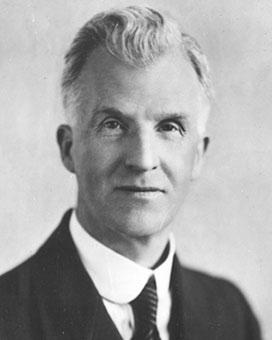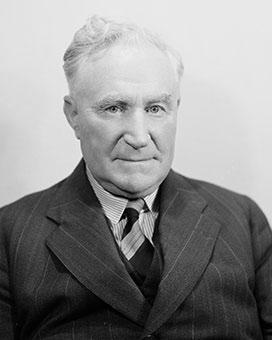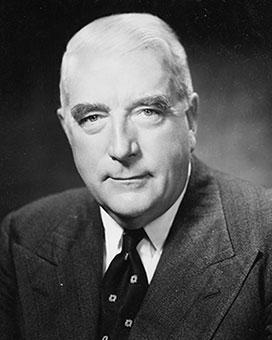On this page
1920 to 1929
12 Oct 1929: 1st elected to federal Parliament
Lyons was elected as Member of Parliament for the seat of Wilmot (Tas.) in the 12th federal election.
1930 to 1939
6 Jan 1932: 10th Prime Minister
Lyons was sworn in as prime minister after his new United Australia Party won government at the 13th federal election on 19 December 1931.
3 May 1932: Unemployment relief
The Loan (Unemployment Relief Works) Act authorised the government to grant money from a fund of 1,800,000 pounds for relief work approved by employment councils in each state.
1 Jul 1932: The ABC is born
The Australian Broadcasting Commission was established to set up and operate national broadcasting stations. Broadcast programs were to address as many of the interests of the community as compatible with 'suitable broadcasting'.
29 Nov 1932: 9 miles from Gundagai
Lyons unveiled the 'Dog on the Tucker Box' statue near Gundagai, in south-west New South Wales. Thousands of people assembled for the ceremony.
7 Feb 1933: Australian territory in Antarctica
The Australian Antarctic Territory was formally proclaimed by Douglas Mawson aboard the Discovery in Antarctic waters. Britain had ceded Antarctic claims to Australia and the Australian Antarctic Territory Acceptance Act came into effect from 24 August 1936.
14 Jul 1933: Nazi government in Germany
The National Socialist Party assumed power in Germany. It was declared the only legal political party.
15 Sep 1934: 14th federal election
Lyons' United Australia Party won the most seats of any party, but not a clear majority. Lyons formed a minority government with support from Country Party members. 2 months later, the UAP and Country Party formed a coalition.
6 Nov 1934: Egon Kisch
Journalist Egon Kisch was invited to speak at an anti-war conference in Melbourne but he was prevented from leaving his ship at Fremantle. In Sydney, the government tried to bar his entry by giving him a dictation test in Gaelic, knowing he spoke 7 European languages. Kisch challenged the ban on his entry and won the case. He spoke at workers' meetings until he left Australia in March 1935.
6 May 1935: Silver jubilee
King George V and Queen Mary celebrated the 25th anniversary of their reign. Among the guests were Robert and Pattie Menzies, making their 1st visit to Britain.
18 Nov 1935: Invasion of Ethiopia
Australia joined other League of Nations members in advocating sanctions against Italy after Italian troops entered Ethiopia in October. The Lyons government's Sanctions Act 1935 prohibited Australians from all commercial dealings with Italy.
20 Jan 1936: King Edward VIII
The Prince of Wales succeeded to the throne on the death of his father, King George V, but abdicated on 11 December 1936. His brother, the Duke of York was proclaimed King George VI 2 days later.
23 Jan 1936: 10th Governor-General
Lord Gowrie served as Governor-General until 30 January 1945.
6 Mar 1937: Referendum
At this referendum, 2 proposals were rejected by voters. The 1st sought to give the Federal Parliament power with respect to air navigation and aircraft, while the 2nd related to Section 92 of the Constitution, trade within the Commonwealth to be free.
1 May 1937: King George VI
After the abdication of Edward VIII on 11 December 1936, the coronation of King George VI and Queen Elizabeth took place in Westminster Abbey.
24 Jun 1937: Censorship Board
The Commonwealth Literature Censorship Board was established. The new Board (temporarily) lifted the old Book Censorship Advisory Committee's ban on James Joyce’s Ulysses.
23 Oct 1937: 15th federal election
The United Australia Party-Country Party coalition under Lyons and Page defeated the Labor party under James Scullin.
26 Jan 1938: Aboriginal Day of Mourning
The 150th anniversary of the arrival of the First Fleet in Sydney Cove was officially celebrated as Australia's Sesquicentenary. Unofficially, it was a Day of Mourning for Indigenous peoples who lobbied in vain for representation in parliament and for legal equality.
31 Mar 1938: Capricornia
Xavier Herbert won the Commonwealth Sesquicentenary literary competition with his novel, Capricornia, set in the Northern Territory.
15 Nov 1938: 'Pig iron' dispute
Waterside workers at Port Kembla, New South Wales, refused to load scrap iron destined for Japan, arguing that it would be used in munitions factories. Attorney-General Robert Menzies tried to enforce the loading of the cargo.
1 Dec 1938: Jewish refugees accepted
Australia agreed to take 15,000 Jewish refugees fleeing from Europe after the German occupation of Austria and Czechoslovakia.
7 Apr 1939: Death
Lyons became the first prime minister to die in office. He had driven from The Lodge in Canberra to Sydney, en route to his home in Tasmania for Easter, when he suffered a heart attack, dying in hospital in Sydney, on Good Friday.





